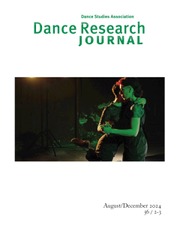No CrossRef data available.
Article contents
Report on Summer Conferences in England: Research in Movement and the International Council on Kinetography Laban.
Published online by Cambridge University Press: 14 May 2024
Extract
The week-end conference on “Research in Movement” convened August 10-12, 1973, at Nonington College, near Dover, Kent, England. Five lectures beginning with an evening session on Friday, August 10, featured the paper on “Ergonomics,” by.Dr. Nigel Corbett (Industrial Engineer, Birmingham University), which was read and discussed by Mr. S. Madeley. He oriented the assembled movement researchers to the fact that “measurement of motion” is of particular concern to physiologists and scientists since the World War II demanded immediate practical solutions (how to survive in a jungle, speed and weightlessness in flying, etc.). Now it is vital that the job be fitted and programmed to the worker. He cited research by Alberg (1968) on tests and models of tasks (52 experiments); by Spitzer & Hethinger (1970) on static work involving large body movement and force factors; by Laban (1950) as utilized in Britain by Paddy McMasters who analyzed filmed worktasks.
The research at Birmingham University focused on three types of actions: weight, breath, reaction-time factors for which examples were set-up each with four tasks for eight different people. The pilot studies are continuing and yielding results, corroborating that movement actions can be successfully measured.
On Saturday, August 11, the next three lectures enthralled everyone. The Principal of Nonington College, Miss Ellinor Hinks, spoke on ”Educational Gymnastics”. Her invention of special equipment created and designed for the exploration of total body movement techniques, conceived and housed in a unique space-gymnasium, is highly effective in training young people who concentrate and inventively achieve far more than pure motor skills. Two films of her work “Movement in the Making, I & II”, demonstrated her new method. As films, they superbly illustrate the physical potentialities of movement with this new type of apparatus (the films can be rented or purchased).
- Type
- Articles and Reports
- Information
- Copyright
- Copyright © Committee on Research in Dance 1973


